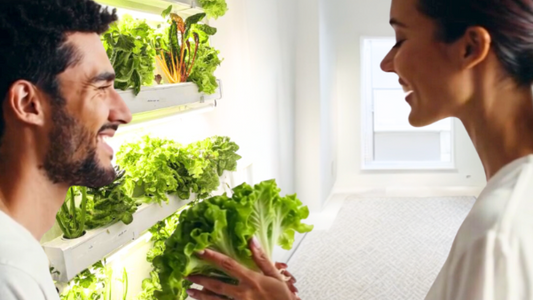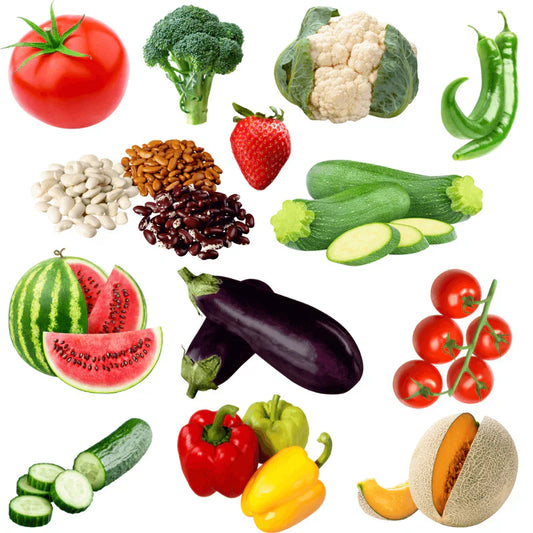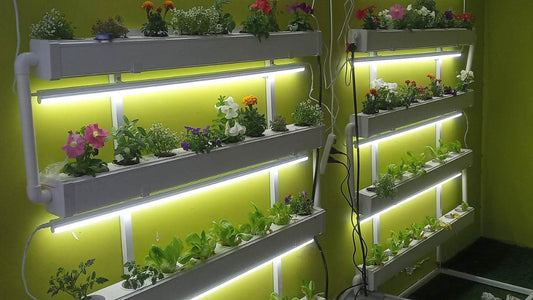An introduction to the fascinating world of hydroponic gardening.
Hydroponics is an agricultural method that has been used for thousands of years. However, despite being an ancient growing technique, it is still bringing progress and new opportunities for human health and global ecology.
How?
A hydroponic system doesn’t rely on soil to feed and grow your plants but instead on the water, which is used to transport minerals directly to the roots – essentially changing all the rules of the growing game.
How does this form of growing work? And how can it benefit you?
Today, we’ll dive deep into the method known as the ‘agriculture of the future’ and explain how you can join the green revolution.
In this guide, you will learn:
- The Problem With Conventional Agriculture
- Hydroponics: The Solution for Sustainable Gardening
- How Does Hydroponics Work?
- How is Hydroponics Better Than Growing in Soil?
- Discover The World of NatureTech Hydroponics

The Problem With Conventional Agriculture
Good soil can be rich in nutrients and minerals that will help plants grow to their full genetic potential. Still, we must remember that it is not food for the plants in and of itself.
Many people believe that plants feed on the soil, but in reality, it is nothing more than a sponge with excellent conditions for life that breaks down organic materials into the elements that your plants feed on. In truth, the soil has little nutritional value, so your plants do not require it to survive.
In nature, there is lovely synchronicity in which all plants come together to maintain the cycle of life. Seeds germinate, plants grow, flowers bloom, new seeds are formed, old plants die, and are eaten, digested, and decomposed by micro-organism communities living in the soil, to turn it into the pure element, food – or fertilizer.
Your plants need this to continue growing and developing in the cycle of life.
When there is no diverse community of microorganisms in the soil (as is often the case in cultivated agricultural soils that are tired, loaded with salts, and devoid of life), there is no way to process the organic materials into the minerals that the plants feed on. As a result, it is impossible to grow in it.
In this case, farmers will often add mineral fertilizer to the tired soil to satisfy the nutritional needs of the plants they are producing – without the need for the same community of micro-organisms.
The problem is that this mineral fertilizer not only reaches the roots of the plants but will also wash down into the aquifers, over-salting the groundwater. Unfortunately, for agricultural areas that have been overworked, this soil salinization will no longer allow for almost any type of plant cultivation.
In reality, industrial agriculture already occupies an area larger than both Africa and all of North America put together.
Moreover, it is the most polluting industry in the world and the leading cause of deforestation. In its current form, it is unsustainable and cannot support us for much longer.
This is where hydroponics comes into play.

Hydroponics: The Solution for Sustainable Gardening
With the knowledge that plants don’t actually need soil but rather nutrient minerals in defined quantities – we can truly disconnect from traditional and less sustainable forms of gardening. This eliminates the need for tillage and ongoing destruction of wild regions vital to world ecology, allowing us to grow our food in isolation and with minimal environmental impact.
Hydroponics eliminates the dependence on soil in cultivation, opening up a new world of possibilities.
Today, hydroponic farms can now be found in NASA spacecrafts, submarines, the desert, shipping containers, supermarkets, roofs, basements, and countless other non-traditional growing locations.
The agriculture of the future is advancing with full force.

How Does Hydroponics Work?
In hydroponic gardening, we use minerals dissolved in water to provide the plants with all the nutrients they require in the most efficient way possible.
When growing in the soil, we have to wait for the biological process that breaks down organic materials to obtain the macro and micro minerals needed by the plants. In contrast, with hydroponic growing, we typically use a mineral fertilizer that immediately provides all of the nutrients required.
Hydroponic mineral fertilizers contain an average formula that satisfies the needs of most plants. When used in its liquid form, it will promptly dissolve in water, forming a nutrient-filled growing solution for your plants.
Minerals dissolved in water are instantly available to plants, and their concentration in solution may be measured and monitored using electrical conductivity. The more minerals there are in the water that breaks down into ions, the higher the electrical conductivity of the water will be.
In agricultural hydroponic farming, it is customary to fertilize the plants using an exact formula tailored to the individual plant type. This way, they can enhance the plant's growth to reach its full genetic potential. In contrast, with in-home cultivation, many gardeners utilize basic hydroponic fertilizers that comprise the wide mineral average of most plants, resulting in high performance and ease of operation.

How is Hydroponics Better Than Growing in Soil?
1. The Plants Grow Larger And Faster
When your plant’s roots don’t have to search for water and nourishment, it can focus its energy on growing more branches, leaves, and fruits – allowing it to grow more quickly! Many studies show that hydroponics enables rapid growth of up to 3x faster and 2x more yield compared to similar conditions in the soil.
2. You Can Save Up to 99% More Water
When growing in the ground, only a small amount of water actually reaches the plants' roots. The rest often seeps down to empty areas, water weeds, or evaporates.
Closed-circuit irrigation is frequently used in hydroponic gardening. This means that the water is fed directly to the roots of the plants within a closed, circulating system that prevents water loss. As a result, your plants get the water they need, and the waste is minimized.
Compared to soil growing, an average hydroponic system is estimated to save at least 85% of the water!
3. It’s Chemical-Free & Much Less Harmful
Chemical sprays have been proven harmful to health but are still frequently used in commercial agriculture and home crops. Mainly to fight pests that live in this natural environment and feed on the plants we grow.
However, when we don’t grow in soil, we don’t have to deal with the pests that originate from it.
Many of the insects and animals that tend to eat the leaves and fruit of your plants simply do not exist in hydroponic cultivation. Therefore, gardeners face fewer challenges and can employ solutions that don’t involve chemical sprays.
For example, did you catch the beginning of an aphid community on the lettuce in your hydroponic system? All you have to do is take the infected plant to a water tap, rinse the leaves well and gently under the stream and return the plant to the system - all without spraying any pesticides.
Monitoring and prevention are the key techniques for keeping a hydroponic system free from pests. Keep track of the plants in your system, respond swiftly to any uninvited guests, and you will be able to avoid using any chemical sprays to protect your plants.

Still not convinced? Here are some more benefits of hydroponic growing:
- Mess-Free: It's a clean growing method, without soil, that you can utilize in your home without worrying about dirtying your living space.
- Low Maintenance: Say goodbye to strenuous physical work. With a hydroponic garden, there’s no need for weeding or working on your knees.
- More Nutritious: Several studies have found that hydroponically grown vegetables are even more nutritious than vegetables grown in soil.
- Compact & Adaptable: This system can be used virtually anywhere! Whether you have a large greenhouse or a small balcony, your crops will have plenty of space to grow.

Discover The World of NatureTech Hydroponics
With all of these incredible benefits, it should be no surprise that hydroponic gardening methods are rapidly growing in popularity.
Having fresh fruits and vegetables available in your home, with minimal time, effort, and money to grow – what’s not to love?
We understand that many gardeners entering the world of hydroponic growing may be new to this. That’s why we’re here to help!
Start by reading our ‘How it Works’ page to learn more, or reach out to our customer support team with any questions you may have.
Already convinced? Explore our selection of premium hydroponic home gardening kits today.




